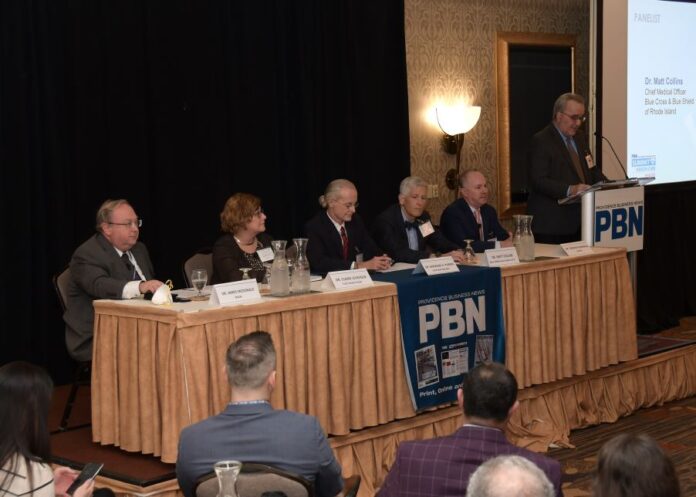
PROVIDENCE – The proposed unification of Lifespan Corp. and Care New England Health System may have been rejected by the Federal Trade Commission and the R.I. Office of the Attorney General, but the two organizations are still looking to come together in a way that stops short of a full merger.
Leaders from Rhode Island’s two largest hospital systems spoke during Providence Business News’ Spring 2022 Health Care Summit held Wednesday morning at the Providence Marriott Downtown, revealing to an audience of about 150 people from the health care industry that they’re still in talks over a partnership involving Brown University and its Warren Alpert Medical School.
“The question is are there things we can do together that achieve half a loaf, half of the mission, a third of the mission – behavioral health, women’s health, pediatric care, pick your care – that will not require regulatory approval?” said Lifespan CEO and President Dr. Timothy J. Babineau. “Not trying to do an end-around around anybody – the FTC or the AG – but we still believe there may be some programmatic things we can do together that, at the end of the day, achieve what we are trying to achieve, which was simply better care for the community.”
Babineau joked that he was “shocked” that he got a question about the failed merger, kidding that he was moving along in Kubler-Ross’s five stages of death and dying from “depression to acceptance,” after quickly going through anger, denial and bargaining. Babineau said he and Dr. James Fanale, CEO and president of Care New England Health System, who was originally scheduled to participate in the summit but was not feeling well, have “resigned” themselves to the fact that a “full asset” merger will not happen “anytime in the foreseeable future,” at least “for the next couple years.”
Babineau spoke on the second of two expert panels that also included Dr. Raymond O. Powrie, Care New England executive chief of medicine; R.I. Department of Health Interim Director Dr. James McDonald; Dr. Claire Levesque, chief medical officer for commercial products at Point 32Health; and Dr. Matt Collins, chief medical officer and executive vice president at Blue Cross and Blue Shield of Rhode Island. The earlier panel featured Lindsay Lang, director of HealthSource RI; Dr. Robert MacArthur, chief medical officer at Commonwealth Care Alliance; Dr. Christopher Ottiano, medical director for Neighborhood Health Plan of Rhode Island; and Dr. Amy Nunn, executive director of the Rhode Island Public Health Institute.
Powrie sought to make it clear that there was “no existential threat” to Care New England in the short-term, but the organization’s financial troubles and need for capital in the long-term require it to “move swiftly” on finding a solution in the wake of the failed merger.
“We’re not in an emergency situation, but we’re not going to spend five years sorting this out,” Powrie said. “We do need to figure out what that is in the months and this year ahead. … I think no successful health care system can go it alone. I think it’s all about working with the community and other partners and being innovative. We hope out of this great disappointment that we can find some very innovative, creative solutions for the people of Rhode Island.”
“If you know someone who delivers health care within 100 miles of here, of course those are people we’ll be talking to,” Powrie said at another point. “And we look toward a solution that creates a sustainable, affordable model of health care. I do feel it’s hard to imagine a solution that doesn’t involve partnerships with Lifespan as well.”
Powrie said a failure to find capital needed to sustain excellence, through a potential acquisition, merger or otherwise, could lead to a two-tiered health care system in the state. Powrie said that would mean people with means will travel to places such as Boston for cutting edge, well-funded complex care, while others will be stuck here with complex care characterized by fewer resources and less-up-to-date standards.
“We’re not there yet. I’m talking years ahead,” Powrie said. “But I do think the sustainable model has to be one where all of us can enjoy a better range of return on margin and can reinvest in ourselves, so every single Rhode Islander can get all the care they need in this state. … You can do a year or two with a tight margin, but in the long run, you do need some capital coming in that sustains the excellence.”
Babineau said the past two years of the COVID-19 pandemic have “absolutely decimated” the health care system, with employee attrition continuing to be a major problem. He said Lifespan is still struggling with long waits for elective surgery, closed beds, closed operating rooms and a labor crisis.
Babineau said Lifespan typically has a job vacancy rate of 700 or 750 people, but right now it’s running at 2,700. The company is now trying to “shift the narrative” when it comes to staffing.
“We have an enormous rebuild ahead of us,” Babineau said. “I have eliminated the word unprecedented from my vocabulary. I think I said the word ‘unprecedented’ 7 million times [during the pandemic]. I don’t say it anymore. … I say, ‘Hey, gang, this is the war of our lifetime. And for those of you who stuck with us during that war, thank you. For those of you who needed to step away, I understand that. Come back. We need you. Because I’m pretty sure, as a physician of 30 years, that if you do come back and you did stick with us, a couple years from now you’re going to look back at this time with enormous pride of professional purpose that says, I answered the call.’ … That’s really the message we’re trying to get out to the community.”
Marc Larocque is a PBN staff writer. Contact him at Larocque@PBN.com. You may also follow him on Twitter @LaRockPBN.












